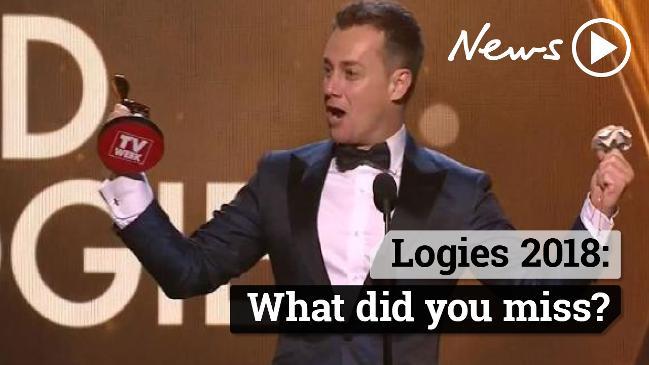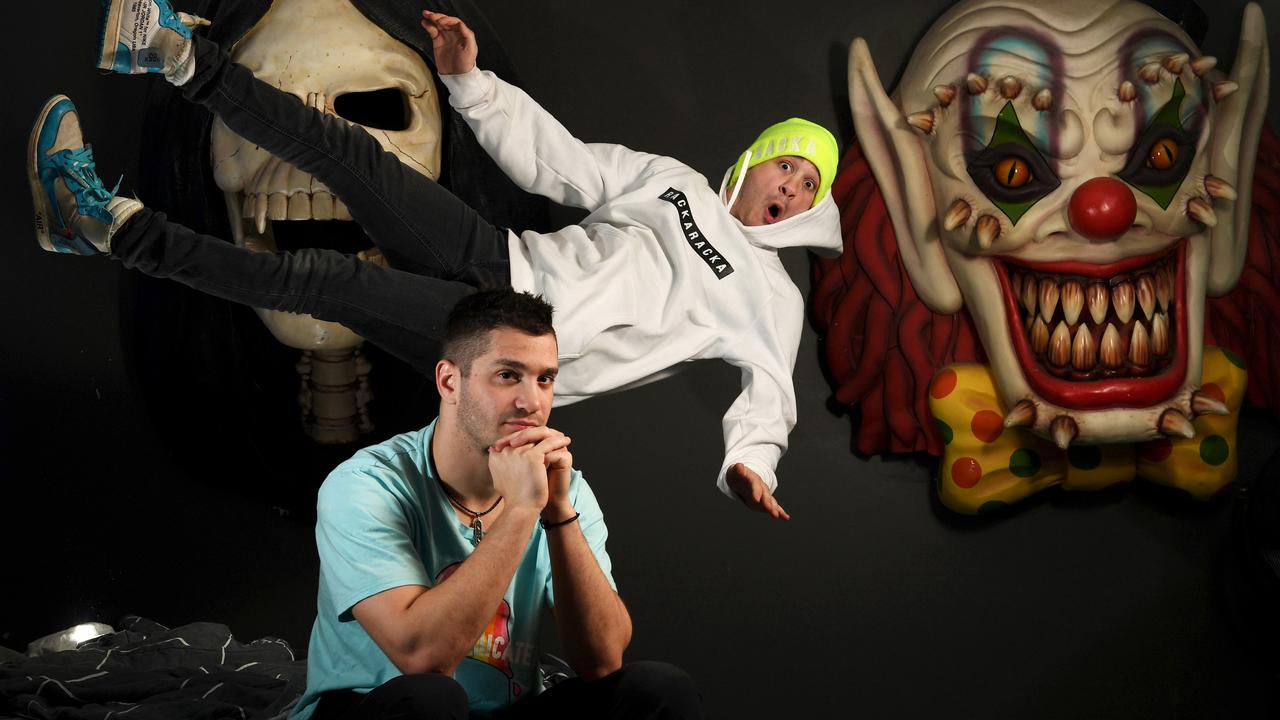Comedian Shaun Micallef turns from TV to the stage with new book, The Uncollected Plays of Shaun Micallef
Before he was Mad as Hell, Shaun Micallef was a legend of the University of Adelaide law review — we step into the mind, and explore the genius of one of South Australia’s favourite comedians. READ AN EXCERPT FROM THE NEW BOOK.

- Back in 2012: Q & A with Shaun Micallef
- Shaun Micallef’s Logie acceptance speech
- Talkin’ Bout Your Generation with Shaun Micallef
Nothing is ever wasted in the world of comedian Shaun Micallef.
Little half-formed jokes and ideas are stored away in the dark recesses of that sharp comedic brain for potential future use.
“I have stuff lying around in drawers in the corners of my mind that I’m assuring myself will one day come in handy,’’ he says.
The nothing-is-ever thrown away mantra has come in handy for his latest project, The Uncollected Plays of Shaun Micallef, a book which started life during his time as a law student at the University of Adelaide.
Micallef was a star in the Uni law review, writing and acting, and had a drawer full of plays from that era he thought would be fun to publish.
He even convinced a publisher that it was a good idea. There was only one problem. He found they weren’t all that good.
“I threw all that out and just said I will just write some new ones,’’ he says.

The old ones were written to be performed, but he says the new ones are meant to be read.
“I mean I am sure you can perform the ones that are in the book, but ideally they are best in the cartoon world that exists in your head when you read them,’’ he says.
As you may expect from Micallef, his new plays are a wonderful collection of the absurd, the silly, the laugh-out-loud funny and the rather clever.
Many are parodies.
There’s a touch of Shakespeare, some classical Greek tragedy, a bit of the Elephant Man and even appearances from Moses, Elvis Presley and Frank Sinatra.
There is a reworking of the classic Dr Faust story, where Micallef works in a South Australian reference.
When Mephistopholes offers Dr Faust an opportunity to “fulfil your wildest fantasies and dreams and desires’’, the good doc replies: “Well … my wife and I have always wanted to go on a holiday to Lobethal. Just for the long weekend. We’d like to visit the Tweed Museum and see the Christmas lights’’.
Back in the (kind of) real world, Micallef adopts the voice of the old English Carry On comedian Kenneth Williams to explain why.
“Oh, Lobethal, I would love to go to Lobethal,’’ he says as Kenneth before returning to Shaun.
“It just sounds funny.’’ He goes on.
“There is a suburb near where I lived called Renown Park which no one has ever heard of which I always found amusing.’’
Micallef lived in Adelaide until he turned 30 and still likes to pepper his comedy with Adelaide names and places.
Two of his colleagues on his TV show Mad as Hell, Francis Greenslade and Gary McCaffrie are mates from those law review days at Adelaide Uni.

Micallef says he retains a fondness for Adelaide, even it was a bit “safe and dull.’’
But that blandness also helped form the comedian that Micallef became.
“I think resorting or escaping into absurdity and fantasy is probably just where I went because life was so comfortable and boring.’’
His dad Alf was from Malta and worked in a car dealership, while his mother Judy was a mortgage consultant. Micallef was school captain at Sacred Heart College at Brighton and went to Adelaide Uni to study law with a bit of performing thrown in.
The Uncollected Plays are interspersed with small biographical snippets of growing up in Adelaide, which the 56-year-old assures are mostly true.
At the age of 12 he had a job at the Royalty Theatre pointing a spotlight at Johnny Farnham, Colleen Hewitt and Nancy Hayes in a production of Pippin.
Another chapter recalls a meeting with former prime minister Gough Whitlam who came to a Uni review called Star Laws.
Happily for Micallef, Whitlam was asleep by the time the student came on and did a bad impersonation of the great man.
Still, Whitlam took the cast to lunch after the performance.
“He called for the bill, explaining that as a guest of the university, he received a ‘modest stipend which almost covered the cost’. We all laughed, even though none of knew what a stipend was.’’
After university, Micallef worked for a law firm called Ward and Partners for 10 years before, at the suggestion of his wife Leandra, he decided to have a crack at professional comedy.
“I knew I could be funny, but you can be funny at a dinner party and you don’t know if it’s going to pay,’’ he says.
“From Adelaide I did not see how you could possibly parlay it into anything apart from a hobby.
“I used to sit back and watch Barry Humphries and think — ‘how did he do it? He is from Australia. How did he end up in Bedazzled with Peter Cook and Dudley Moore? How did he do that? How did he get there from here?’’’

When he was 30 he decided it was time to “chance my arm’’.
“It seems braver in retrospect,’’ he reflects.
“I think I probably had the sense it’s now or never to find out whether I am any good at doing this.’’
He found a job writing for the TV comedy show The Big Gig and for Irish comedian Jimeoin, then for the sketch comedy series Full Frontal.
Initially, he didn’t see himself as a performer, but his characters such as the male model Fabio and the brain damaged boxer Milo Kerrigan made him one of the bigger stars of the show.
Another was Eric Bana, who found his fortune in Hollywood.
It was the start of a long career in television, albeit with varying degrees of success.
There was, among many others, the Micallef Program, Micallef Tonight, Newstopia, Talking ‘Bout your Generation and Shaun Micallef’s Mad as Hell, which is now in its ninth season.

MAD AS HELL
The appeal of Mad as Hell is there is nothing else quite like it on television.
It’s absurd, silly and clever.
There’s a rotating cast of marvellously ridiculous characters (Vice rear cabin boy Bobo Gargle, Casper Jonquil, Dolly Norman Darius Horsham).
It punctures the egos of MPs of all stripes and colours and Micallef says there is no political agenda to the show.
There are no writers’ meetings, no checklist of topics that need to be covered — “it’s just where the joke takes us”.

“I think if I was to, god-forbid, ever hold myself out to be having a serious point of view on something that would be the death of us,’’ he says.
But he also believes there has been a change in the relationship between comedy and politics over the last five years, in so much as the right side of the divide has become a much bigger target for jokes.
“There is a kind of ineffectualness that has always been with the left side of politics which has always been fun to laugh at,’’ he says.
“Now there is an ineffectual quality to the conservative side of politics, which is really interesting, that has happened in the last five years.
“They are blind to how ridiculous they look and that is really interesting stage to hit with our political system. They are in such a bubble they are not quite aware of how naked they are as they walk down the street.’’
In an age where some question whether “political correctness’’ is killing comedy, Micallef says there are not too many subjects that are beyond the reach of jokes, although some have tried to impose the occasional limitation.
“I have actually run afoul a few times on the ABC just referring to those sorts of things,’’ he says.
“You don’t make jokes about Weary Dunlop, you don’t make jokes about Donald Bradman. And I think, `well, why not?’.
“I have never avoided a subject matter just because I thought it might be misinterpreted. You are in for a hiding if you start self-censoring.’’
The plays grant Micallef even more freedom.

It’s easier to get away with some things on the page than it is on screen.
The Uncollected Plays includes a short piece called The Great War and How it Got that Way. It’s both funny and somewhat poignant, its central idea being the military picking someone to become “the Unknown Soldier’’.
“Why me, sir,’’ asks the unfortunate conscript.
“Colonel: Because of all the Australian soldiers serving King and Country, your dimensions fit exactly the coffin we have selected to send your body home in.’’
You can imagine the perpetually outraged would have been lining up to complain if Micallef tried that on television.
But as the comedian says, all comedy is bound to upset someone.
“Obviously if you make a joke a joke about anything at all you are kind of making an ‘out’ group where those in the ‘in’ group are laughing at it. That’s kind of how it all works.’’
It keeps working for Micallef. Mad as Hell, which has just celebrated its 100th episode, will be back for its tenth season in 2019, presumably to poke multitudes of fun at politicians as the country prepares for another federal election and possibly its sixth prime minister in six years.
For all of which. Micallef remains eternally grateful.
“It all came rather late and everything is a surprise and a delight as far as I’m concerned,’’ he says.
“The fact that I have continued to be in employment in some form or another for the last 20-odd years, doing this thing, is nothing short of a miracle.’’
IMPERSONATING GOUGH (BADLY)
A couple trapped in a self-destructive marriage spend a rainy Sunday arguing with each other in a way that set the West End on fire in the mid-1950s. A version of this play was performed in 1991 in the University of Adelaide’s Little Theatre as part of a show called The Ages of Man. I’m not quite sure why we called it The Ages of Man.
Obviously it’s a reference to Shakespeare’s As You Like It, but since Shakespeare talks about there being seven ages of man and we didn’t mention any at all, I can’t see the connection. I suspect that, like most university students, we were trying to sound clever.
I had written and performed in many shows while I was at university, and most of these were put on in the Little Theatre. Usually they were revues mounted by the Law Students’ Society and had titles like Barrister Galactica and Subpoena Hard Day’s Night. We would write and rehearse in the fortnight after exams and then put them on for a week or so before an extraordinarily tolerant audience. Tickets were five dollars, which doesn’t seem like a lot of money now, but back then it could buy you a jug of beer and a packet of pork rinds.
You did get bang for your buck though, particularly on opening night when the show sometimes ran for over three hours. Gough Whitlam came to see a show called Star Laws and had mercifully fallen asleep by the time I took to the stage in a bad wig and an even worse impersonation of him (he had recently done a TV ad for pasta sauce that we thought worthy of parody).
He woke up for the finale as we pelted the audience with dog food and was good enough to take some of us to lunch the next day. He didn’t mention the show, and I pretended I hadn’t been in it. Instead, we asked him questions about The Dismissal (which he graciously answered) and thanked him for our free university education (which most of us were in the process of squandering).
Emboldened by house wine, someone even asked about the Italian he spoke in the TV ad: did he speak the language or had he learnt it especially? He looked over to me and said, with a wry but nonetheless withering half-smile, that he had read it off a card.
The lunch wound up and he called for the bill, explaining that as a guest of the university, he received ‘a modest stipend which would almost cover the cost’. We all laughed — even though none of us knew what a stipend was. ●
Extracted from The uncollected plays of Shaun Micalleff, Affirm Press, $34.99, out now


